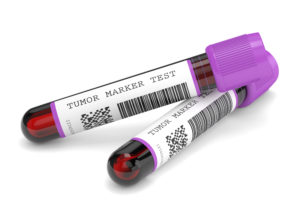 A biomarker is a gene, protein, or molecule produced by the body or tumor in a person with cancer that tells a doctor something about the cancer cells. MBC experts have developed new recommendations for how doctors use biomarker information to carefully make MBC treatment decisions as highlighted in our previous two posts (November 2022; December 2022).
A biomarker is a gene, protein, or molecule produced by the body or tumor in a person with cancer that tells a doctor something about the cancer cells. MBC experts have developed new recommendations for how doctors use biomarker information to carefully make MBC treatment decisions as highlighted in our previous two posts (November 2022; December 2022).
However, some biomarkers require more studies and clinical trials before they can be recommended to guide treatment decisions. These include ESR1 and PALB2 gene mutations, TROP2 protein, homologous recombination deficiency (HRD), and circulating tumor cells (CTCs). Although ctDNA testing is currently not recommended for all people with MBC, ctDNA testing can be used to identify PIK3CA or ESR1 mutations in people with HR+ MBC. People with a PIK3CA mutation may be eligible for alpelisib (Piqray®), and people with an ESR1 mutation may be eligible for elacestrant (OrserduTM).
This month, we continue with the last post in our 3-part series about the biomarkers from these new recommendations that do not have enough information to support their use in treatment decision-making. Clinical trial participation is important to generate and collect information that may lead to new treatment recommendations.
Click the links below to read about emerging research about these biomarkers and clinical trials related to these biomarkers.
Biomarkers for Guiding MBC Treatment
- MedPage Today (Article and Video): Biomarkers for Systemic Therapy in Metastatic Breast Cancer
- Journal Article: Biomarkers for Systemic Therapy in Metastatic Breast Cancer
- Breastcancer.org: Types of Genetic Tests
ESR1 Mutations and Oral Selective Estrogen Receptor Degraders (SERDs) and CDK 4/6 Inhibitors
- Practice Update: Amcenestrant, an Oral SERD, in People with ESR1 Mutations
- Metastatic Trial Talk: Update on Oral SERDs for Estrogen Receptor-Positive MBC
- Practice Update: Fulvestrant and Palbociclib, a CDK 4/6 Inhibitor, in People with ESR1 Mutations
- Current clinical trials: MBC Trials for ESR1 Mutations
- Current clinical trials: MBC Trials for SERDs
PALB2 Mutations and PARP Inhibitors
- Facing Our Risk of Cancer Empowered (FORCE): PARP Inhibitor for MBC with PALB2 Mutation
- Current clinical trials: MBC Trials for PALB2 Mutations
- Current clinical trials: MBC Trials for PARP Inhibitors
HRD and PARP Inhibitors
- MedPage Today: PARP Inhibitors in Triple-Negative Breast Cancer with HRD
- Current clinical trials: MBC Trials for HRD
- Current clinical trials: MBC Trials for PARP Inhibitors
TROP2
- ASCO: Is TROP2 Expression Associated With Benefit From Sacituzumab Govitecan?
- Current clinical trials: MBC Trials for TROP2
ctDNA and Circulating Tumor Cells (CTCs)
- Metastatic Trial Talk: Circulating Tumor Cell Testing
- OncLive: ctDNA Testing in Breast Cancer
- Practice Update: Liquid Biopsy-Based Biomarkers in Hormone Receptor-Positive HER2-Low MBC
- US Food and Drug Administration: Alpelisib and ctDNA Test for MBC
- US Food and Drug Administration: Elacestrant and ctDNA Test for MBC
- Current clinical trials: MBC Trials for ctDNA
- Current clinical trials: MBC Trials for CTCs
Last Modified on September 26, 2023
